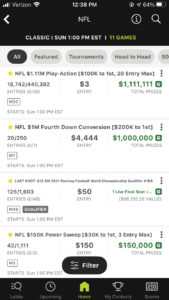Early on Sunday, I take my phone and open a daily fantasy sports betting app called DraftKings. I create a contest for the day and submit it to the 33 members of my Fellowship of Honorable Beekeepers group. The name was randomly generated by the app when I created the group, and it has stuck. This contest is $3 per person, though DraftKings takes a few cents off the top from each user.
I spend the rest of the morning crafting a lineup — or two, or three, or four — to enter in this group’s contest and other public contests. Users pick 9 players from any of the football teams scheduled to play that day. (Yes, 9, not 11, because you’re not exactly fielding a team; instead, you’re picking position players strategically.)
Each user has an imaginary budget of $50,000 to pick players, whose prices range from $3,000 to around $10,000. The amounts are arbitrary. Each user starts with the same imaginary budget.
Real money changes hands, however, when a user enters a lineup in a public contest with an entry fee. Some cost thousands of dollars to enter and have only 100 participants with only the top five finishers getting a payout. The rest lose everything. Other contests allow tens of thousands of users paying as little as $1 to enter. Those have a larger number of winners.

Maybe you’ll break even, or win $20. But chances are you’ll lose. And very, very rarely do you win big money in daily fantasy sports (DFS). If you do, and you’re an avid user, you’re likely to pour that money right back into other contests.
These games exist for basketball, hockey, college football, golf, you name it. Football is by far the most popular.
In some states, anyone over 18 can create an account on DraftKings or similar apps like FanDuel, Underdog, and Monkey Knife Fight. DraftKings was founded in Boston in 2012 and quickly became the number-one DFS platform. In Massachusetts, users must be 21 or older.
Underdog and Monkey Knife Fight allow users to bet “over-unders” on individual players. One can bet that the player will rack up over or under a certain number of points or touchdowns scored or yards gained. You can group these picks into a “parlay,” and if all of them are correct you win a jackpot.
Did I mention that sports betting is illegal in Massachusetts? That’s right — but “fantasy sports” are not “sports.”
The contests on these apps are governed by both federal and state laws. Federal law specifically exempts DFS contests from the Unlawful Internet Gambling Enforcement Act (UIGEA), according to draftkings.com. State laws vary. Massachusetts allows them.
Essentially, the feds and the state agreed that the contests are based on skill and not luck. Even though they enable users to bet on virtually every aspect of the game, they are not considered “sports betting.”
My friends and I have been playing for about three years, but only during football season. It adds another level of fandom to the football-watching experience.
Each contest in our group is $3 per entry. Some of us venture into public contests. Last Sunday, I spent $37 doing this. I won that back plus another $56. Not bad for sitting on my couch. But it doesn’t always go that well.
Once a user has set up an account, the sky’s the limit. You could dump your entire bank account into a contest with no warning popping up to say that’s not a good idea.
Bets on Beacon Hill
The state legislature is considering legalizing sports betting. The Mass. House approved H.3977, “An Act Regulating Sports Wagering,” in July. Meanwhile, state Sen. Eric Lesser of the First Hampden and Hampshire District has pushed S.269, “An Act to Establish Sports Wagering in the Commonwealth” in the Senate.
The Senate hasn’t done much to move the conversation along, but on Nov. 18, the Mass. Gaming Commission approved a sports betting study, according to the State House News Service. It is expected to be completed by June 2022. The Gaming Commission would most likely regulate the industry if it were to be legalized.
Sports betting is already legal in Rhode Island and New Hampshire and revenues are pouring in. For now, fans can cross the border to place bets or continue to get their kicks from daily fantasy sports apps.
Nineteen percent of Americans over age 18 participated in fantasy sports contests in 2019 — up from 6 percent in 2014, according to the Fantasy Sports & Gaming Association.
“I probably spend $50 every week during football season,” said Eastham resident Rory Voke of his daily fantasy sports habit. “I don’t really see it slowing down. It’s almost impossible to watch an NFL game without seeing some kind of DFS promo.” And, Voke noted, “It’s on my phone.”
Eventually, Voke thinks, there will probably be some sort of rollback, something like what happened with big tobacco marketing. But for now there will have to be more understanding of the harm done by these contests for things to change.
